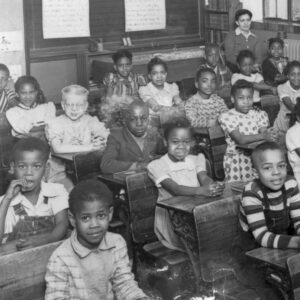Counterpoint: Vouchers Are Not the ‘Civil Rights Issue of Our Time’

For an alternate point of view, see: “Point: Parents Must End the Teachers Unions’ Stranglehold on Education”
In 1958, three years after the Brown v. Board of Education order to integrate American schools, the Texas legislature debated a plan that would offer vouchers to parents who opposed the idea that their children would learn in diverse racial settings. Echoing similar efforts throughout the U.S. South, the Texas bill left no ambiguity about the voucher’s purpose. “Such aid,” the legislation read, “should be given only upon affidavit that the child was being withdrawn from the public schools due to the parents’ dislike of integration.”
That voucher bill failed, and 67 years later—70 years this month after the Brown decision itself—Texas still has yet to pass a voucher system. But I think about this piece of legislation every time I hear the claim, from Donald Trump on down, that vouchers and related school choice bills are “the civil rights issue of our time.”
No. They are not.
In the early days of modern voucher systems that use taxpayer funds for private K-12 tuition—1990 through roughly 2010—vouchers were largely limited to students in a handful of urban settings like Milwaukee, Cleveland, and Washington, D.C. That fact, combined with firm albeit slowly lifting caps on income for participants, meant that vouchers went disproportionately to children of color.
A handful of studies through 2002 showed those students realized some academic gains as a result. Over the past decade, however, as vouchers expanded into statewide systems in places like Indiana, Louisiana, Ohio, and again in Washington, D.C., those results became negative—catastrophically so. How bad? In Louisiana, for example, students who used a voucher to transfer from public to private school suffered academic declines more than three times what Hurricane Katrina did to test scores for students who survived that calamity. And like Katrina’s victims, Louisiana’s voucher users at that time were disproportionately Black.
The main culprit was the fact the best-run private schools didn’t take vouchers or the students who had them at the time. Louisiana’s system pushed students of color largely into D and F-rated private schools, and the results showed. That’s why I’ve called vouchers the education equivalent of predatory lending: all promise, no results.
Today, however, as voucher systems grow in number and in scope, those warning signs for children of color are changing into something else. With income caps lifting, and now 10 states and counting with “universal” vouchers for all children, the vast majority of new users are White and coming from wealthier communities. We’ve seen this pattern in new data from Ohio and North Carolina, as well as in Arizona.
There’s strong evidence that most of these students were already in private school even before getting the voucher. And new data shows many private schools simply raise tuition further once taxpayers begin picking up some of the tab through the emerging voucher system.
Even when they do use vouchers, students of color are disproportionately likely to leave their private schools—either because they are pushed out or for some other reason. These students are also the most likely to be struggling academically. What this means is that vouchers may provide a temporary coupon to change schools but are hardly a long-term solution to problems of racial inequality that persist across schools and communities.
Beyond the data, it’s important to note that many of the same people pushing the claim that vouchers are a civil rights issue, are also those who want to ban teaching about racial inequality in public schools. Florida Gov. Ron DeSantis, who signed the nation’s largest voucher bill last year, has also repeatedly insisted that slavery had some benefits for African Americans. In Arkansas, home to some of the most important moments in actual civil rights history, the same legislation that created vouchers in that state also put strict new limits on the teaching of race in public schools—and removed African American History from the state’s list of approved AP courses.
All of this simply means that when we look beyond claims and slogans about vouchers providing a new civil rights agenda, the results suggest entirely the opposite.
Saying something doesn’t make that something so.



